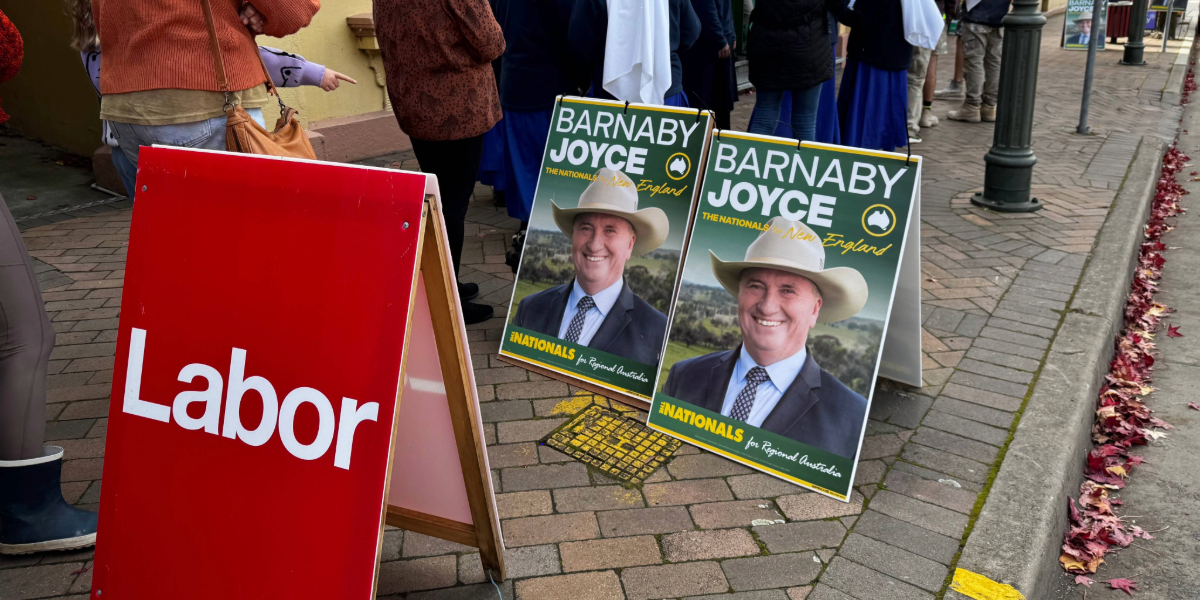So that was an election, apparently. You may have missed it if you were waiting on hold to book a doctor’s appointment. Took barely an hour for Antony Green to call it.
While the national media tallied swing percentages and debated the correct format of a democracy sausage (onions on top, of course), voters in our region were weighing up something far more fundamental: whether the system even acknowledges their existence.
At first glance, Labor’s bump, and the Liberals’ spectacular crash and burn, suggest a tidy story of national mood. But in truth, the electorate’s mood was anything but coherent. This was not left versus right. Greens had almost as bad an election as the Liberals, while the Nationals held ground and One Nation had a stunning bump in first preference votes – thanks largely to the huge mass of disaffected voters – but failed to get anyone elected.
In New England, the Nationals didn’t just hold ground, they gained. This wasn’t a surge of conservative ideology so much as a weary shrug towards the only party still bothering to show up with boots on and fight, and of course the big personality presence of Barnaby. The Nationals retained local seats but they weren’t rewarded for brilliance, they were rewarded for being physically present and vaguely functional. When there is no genuine competition, that can be all it takes.
In the end, the 2025 election wasn’t a red wave or a blue wipe out or any other coloured metaphor. It was a collective sigh, a splintered, contradictory grumble from disparate communities facing different issues, but united in that they are increasingly unsure that our leaders can hear them at all.
The election wasn’t all about cost of living either. What the city pundits failed to grasp in their endless vapid analysis of the election is that regional frustration isn’t about affordability, it’s about accessibility. Services once taken for granted are now mythical entities, or too far away to be useful.
Need to see a doctor? Good luck.
Want to make a phone call on your mobile phone outside of town? See how you go, but even if you have signal the service will likely be “congested” thanks to an extra crow in the vicinity, or whatever Telstra’s excuse is today.
Want to actually go in to a bank branch? Might need to make the day of it and head to a bigger centre.
Need to catch public transport? You’re so funny.
It’s a sad but true fact that there’s no affordability crisis when you literally don’t have access to the thing to pay for it.
And rural voters are sick of going without, and being told to make do. That will not do, pig.
Take the Albanese Government’s freshly spruiked 1800Medicare service. You’d be forgiven for thinking this was some kind of new-age solution to the health crisis. It’s not. It’s Health Direct with a coat of fresh paint and a marketing campaign, and yet another ‘convenience’ service designed for the city that will fast become the only service in the regions.
In Armidale, residents have already suffered through this charade with the failed state funded Urgent Care, dialling, waiting, being told to drink water and have a lie-down, or see their GP in a month, while actual health care, urgent or otherwise, remains a cruel illusion. Telehealth, like many ideas dreamt up in city boardrooms, is a handy supplement for the well-connected, not a substitute for a functioning local clinic.
Oh, and reliable phone and internet services would also be required so we can access telehealth when it is an appropriate service, like for specialist consults.
There are glimmers of hope in the search for leaders who will listen. The elevation of New England’s own Senator Tim Ayres to the front bench brings a welcome spotlight to the region, and our own voice at the table. Combined with Barnaby’s dogged relentlessness to press our claim regardless of who is in the Lodge, we may yet get a bone or two thrown our way.
But history warns us that big margins make lazy governments fixated on themselves rather than the job at hand. The second Albanese Government is barely out of the gates, and already we’ve watched capable ministers like Ed Husic and Mark Dreyfus be unceremoniously shuffled out, not due to failure, but factional arithmetic. Cue the sniping and smouldering bitterness, certain to undermine any effectiveness, and destroy any care factor for the regions who didn’t vote for them.
Until policymakers start prioritising services over speeches, fundamentals over factions, and communities over caucus, voters will continue to drift, not left or right, but out of reach. Can the parties afford that?
Got something on your mind? Go on then, engage. Submit your opinion piece, letter to the editor, or Quick Word now.


Annabel Doherty Anne, the point is, relevant to the article, that we just don’t figure in the political landscape to the point they figure no point offering the people of New England, (and rural communities in general) anything.